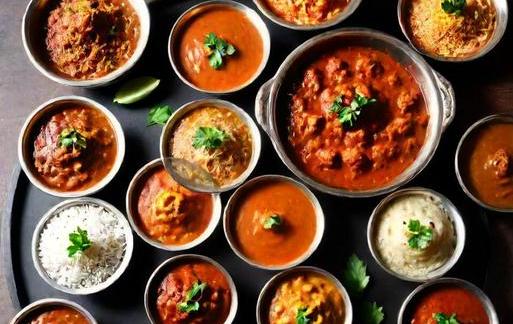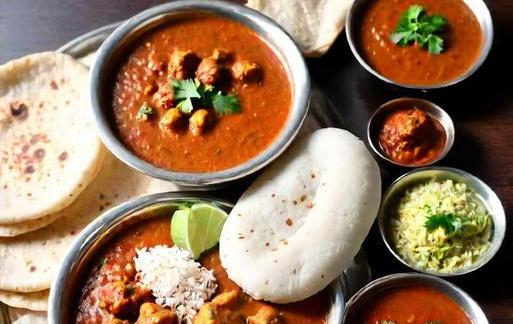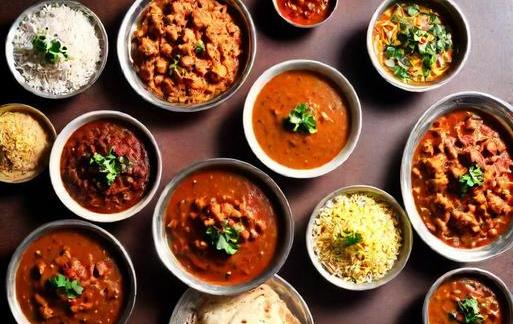- You are here:
- Home »
- Food
- » [REVEALED] Indian Foods That Start With Z
[REVEALED] Indian Foods That Start With Z
Note: This page contains affiliate links.
As an Amazon Associate, I earn from qualifying purchases when you click on the link, but you are not charged extra.
Indian cuisine is a rich tapestry of flavors, colors, and aromas. From spicy curries to delectable sweets, every region in India boasts a unique culinary identity. Exploring the diverse array of dishes reveals not only the country’s gastronomic heritage but also its cultural and historical richness. In this culinary journey, we focus on a less-explored realm: Indian foods that start with the letter “Z”. While not as numerous as some other letters, ‘Z’ has contributed its share to the vibrant Indian palate. Let’s embark on this flavorful exploration and discover the hidden gems that start with “Z”.
Contents
List Of Indian Foods That Start With Z

1. Zafrani Pulao
Zafrani Pulao is a fragrant rice dish that derives its name from the prominent use of ‘zafran’ or saffron. Saffron imparts a distinctive golden hue and a subtle floral aroma to the rice. This dish often incorporates a mix of dry fruits, such as cashews and raisins, providing a delightful sweetness that balances the savory notes. Zafrani Pulao is a favorite during festive occasions and celebrations, where its rich and aromatic profile elevates the dining experience.
2. Zunka Bhakar
Zunka Bhakar is a traditional dish from the state of Maharashtra, known for its simple yet flavorful preparation. The dish consists of a spiced gram flour (besan) mixture cooked with onions, green chilies, and various spices. It is commonly paired with Bhakri, a dense and unleavened bread made from millet or sorghum flour. Zunka Bhakar represents the essence of Maharashtrian comfort food, with its robust flavors and wholesome appeal.
3. Zarda
Zarda is a sweet and aromatic rice preparation that often graces festive tables in India. Originating from the Mughlai cuisine, Zarda involves cooking basmati rice with saffron, sugar, and ghee. The dish is then garnished with fried dry fruits and nuts, providing a delightful crunch and enhancing the overall richness. Zarda is not only visually appealing, with its vibrant colors, but also a symphony of sweet and fragrant flavors that captivate the taste buds.
4. Zeera Aloo
Zeera Aloo is a popular side dish made with potatoes and cumin seeds (zeera). This simple yet flavorful preparation involves sautéing boiled potatoes with cumin seeds, turmeric, red chili powder, and other spices. The result is a delicious and aromatic dish that pairs well with various bread and rice options. Zeera Aloo showcases how a few humble ingredients can come together to create a dish that is both comforting and satisfying.
5. Zarda Pulao
Zarda Pulao, often confused with Zarda mentioned earlier, is a distinct dish that hails from the Awadhi cuisine. This aromatic pulao is characterized by its use of basmati rice cooked with ghee, saffron, and a mix of aromatic spices. What sets Zarda Pulao apart is the addition of caramelized sugar or jaggery, imparting a sweet undertone to the dish. Garnished with fried dry fruits, Zarda Pulao is a perfect blend of sweet and savory flavors that is sure to leave a lasting impression.
6. Zirakashar Roti
Zirakashar Roti is a lesser-known bread preparation that originates from the Kashmiri cuisine. This unique bread is made with a combination of whole wheat flour, sesame seeds, and poppy seeds. The addition of these seeds not only enhances the nutritional value of the bread but also imparts a distinct nutty flavor. Zirakashar Roti is often served with traditional Kashmiri dishes, adding a delightful crunch and earthy undertones to the meal.
7. Zaal-ae-Aab
Zaal-ae-Aab, also known as Zalabiya or Jalebi, is a popular Indian dessert that has become a sweet indulgence across the country. Made by deep-frying wheat flour batter into intricate shapes and then soaking them in sugar syrup, Zaal-ae-Aab is characterized by its coiled or pretzel-like appearance. The result is a sweet and sticky treat that is enjoyed during festivals, weddings, and other joyous occasions. The orange or yellow color of Zaal-ae-Aab adds to its visual allure, making it a feast for the eyes as well as the palate.
In the vast landscape of Indian cuisine, the exploration of foods that start with 'Z' provides a unique glimpse into the culinary diversity that defines the country. From the fragrant Zafrani Pulao to the sweet and sticky Zaal-ae-Aab, each dish tells a story of regional influences, cultural traditions, and a passion for creating unforgettable flavors. While some of these dishes may be less known on a global scale, they play a significant role in the local culinary tapestry, contributing to the richness and depth of Indian gastronomy. As we conclude our journey through the lesser-explored realm of 'Z' in Indian foods, it becomes evident that even the seemingly uncommon letters bring forth a treasure trove of culinary delights. Whether you're a seasoned food enthusiast or a curious newcomer to Indian cuisine, exploring the diverse array of dishes that start with 'Z' is a journey well worth taking. So, the next time you find yourself perusing an Indian menu, don't overlook the hidden gems that begin with the elusive letter 'Z' – you might just discover your new favorite dish.
Significance

Indian cuisine is a vast and diverse tapestry of flavors, aromas, and textures, reflecting the rich cultural heritage and varied landscapes of the country. When it comes to exploring Indian foods, we often find ourselves familiar with classics like biryani, curry, dosa, and samosa. However, delving into the lesser-known realms of the Indian culinary world can be a fascinating journey.
The significance of exploring Indian foods starting with the letter "Z" lies not just in the novelty of the quest but also in understanding the regional and cultural influences that shape these dishes. Indian cuisine is not a monolithic entity but rather a mosaic of diverse regional cuisines, each contributing distinct flavors and techniques. By exploring less common dishes, we gain a deeper insight into the culinary diversity that defines India.
Category-Related

1. Zarda – Sweet Saffron Rice
Overview:
Zarda is a traditional sweet dish made with fragrant basmati rice, ghee, sugar, and saffron. This dish is often prepared during special occasions and festivals, adding a touch of sweetness to celebratory meals.
Ingredients:
- Basmati rice
- Ghee (clarified butter)
- Sugar
- Saffron
- Cardamom
- Dry fruits (almonds, cashews, raisins)
Preparation:
- Cook the basmati rice until it’s fluffy and aromatic.
- In a separate pan, prepare a sugar syrup with saffron and cardamom.
- Mix the cooked rice with the sugar syrup, ensuring each grain is coated.
- Add ghee-roasted dry fruits for texture and flavor.
- Zarda is ready to be served, radiating a beautiful saffron hue and a delightful aroma.
Regional Variations:
Different regions of India may have their own variations of Zarda, incorporating local spices and flavors. Some versions also include ingredients like coconut, pineapple, or even grated carrots for added richness.
2. Zunka Bhakri – Spiced Gram Flour Curry With Flatbread
Overview:
Zunka Bhakri is a traditional Maharashtrian dish that combines spiced gram flour curry (Zunka) with unleavened flatbread (Bhakri). This dish is a staple in many households in Maharashtra and is known for its simplicity and robust flavors.
Ingredients:
- Besan (gram flour)
- Onions
- Green chilies
- Mustard seeds
- Cumin seeds
- Turmeric powder
- Coriander leaves
- Oil
- Salt
Preparation:
- Prepare a mixture of besan, chopped onions, green chilies, and coriander leaves.
- In a pan, temper mustard seeds, cumin seeds, and turmeric powder in hot oil.
- Add the besan mixture and cook until it forms a dry and textured curry.
- Serve Zunka with Bhakri, a flatbread made from coarse wheat flour, for a wholesome meal.
Regional Variations:
While Zunka Bhakri is a Maharashtrian specialty, variations of this dish can be found in other states, each incorporating local spices and preferences.
Common Themes
Despite the limited options for Indian foods that start with "Z," some common themes emerge when considering these dishes. Sweetness is a prevalent theme, as seen in Zarda, which is a sweet saffron rice dish. This aligns with the Indian culinary tradition of balancing flavors, ensuring that every meal encompasses sweet, savory, spicy, and tangy elements.
Additionally, the use of aromatic spices and herbs is a shared characteristic. Saffron, cardamom, and turmeric are integral components in these dishes, contributing not only to the flavor but also to the vibrant colors that are a hallmark of Indian cuisine.
The inclusion of staple ingredients like rice and gram flour showcases the versatility of these basics in creating a variety of textures and flavors. Indian cuisine, regardless of the letter "Z," celebrates the art of combining simple ingredients to produce complex and satisfying dishes.
Interesting Facts
-
Zarda’s Cultural Significance:
- Zarda is often associated with celebrations and festivals in North India, especially during weddings and religious events. The use of saffron not only imparts a distinctive color but is also considered auspicious in many Indian traditions.
-
Zunka Bhakri as a Comfort Food:
- Zunka Bhakri is a comfort food for many Maharashtrians. Its simplicity and the use of gram flour make it a nutritious and filling meal, perfect for everyday consumption.
-
The Rarity of "Z" Dishes:
- The scarcity of dishes starting with the letter “Z” in Indian cuisine highlights the uniqueness of those that do exist. It showcases the vastness of the culinary landscape, where each letter might not have an abundance of representatives, but those that do are cherished.
Conclusion
In this culinary exploration of Indian foods starting with the letter "Z," we have uncovered the delightful Zarda, a sweet saffron rice dish, and the comforting Zunka Bhakri, a spiced gram flour curry served with flatbread. While the options may be limited, the richness of flavors, cultural significance, and regional variations make these dishes noteworthy.
This journey through the lesser-known corners of Indian cuisine reminds us of the diversity that defines the country’s culinary tapestry. From the aromatic spices to the careful balance of sweet and savory, each dish encapsulates a story of tradition, celebration, and everyday sustenance.
As we continue to savor the familiar delights of Indian cuisine, let the exploration of the less-traveled paths, such as those beginning with "Z," be a reminder that the world of Indian food is vast, ever-evolving, and always ready to surprise and delight our taste buds.


